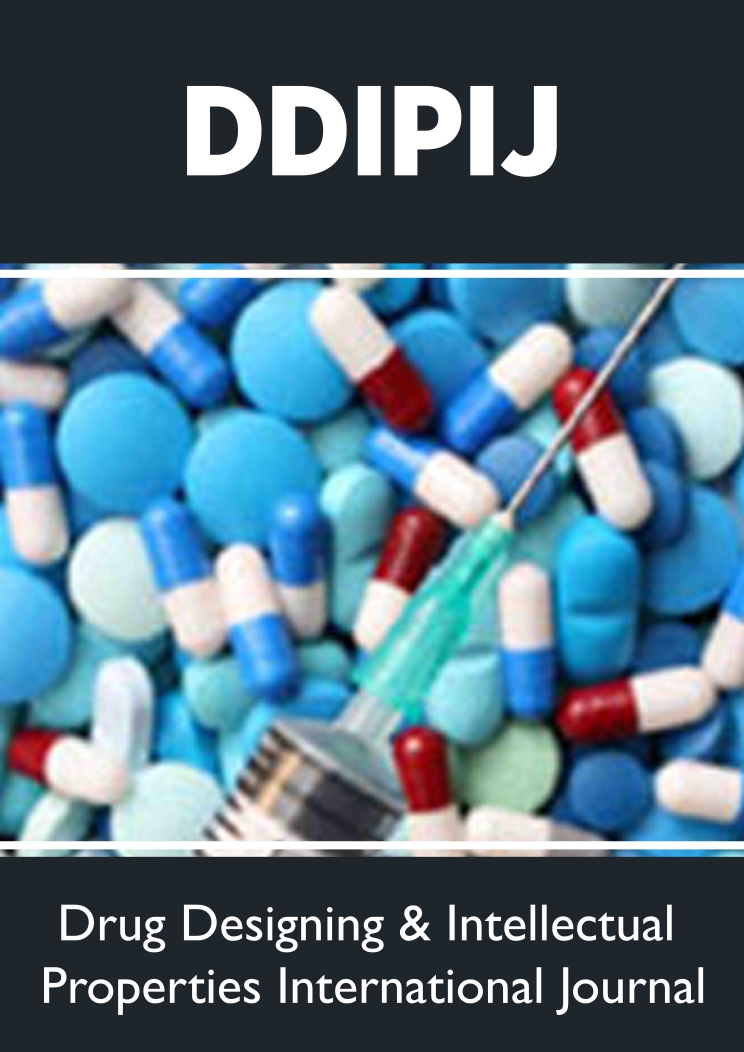
Lupine Publishers Group
Lupine Publishers
Menu
ISSN: 2637-4706
Mini Review(ISSN: 2637-4706) 
Would Hydroxychloroquine Be A New Promising Drug in Managing Antiphospholipid Syndrome? Volume 2 - Issue 4
Amani Mohsen1* and Rabih Chahine2
- 1Obstetrics & gynecology consultant, Palestinian Red Crescent Society, Shatila Camp, Beirut, Lebanon
- 2chairman of obstetrics & gynecology department, Rafik Hariri university Hospital, Beirut, Lebanon
Received: October 10, 2018; Published: October 15, 2018
Corresponding author: Amani Mohsen, Obstetrics & gynecology consultant, Palestinian Red Crescent Society, Shatila Camp, Beirut, Lebanon
DOI: 10.32474/DDIPIJ.2018.02.000141
Abstract
Once Antiphospholipid syndrome (APS) is diagnosed, risk profile of the patient will impact its management whether there was a previous thrombotic event or not, association with other autoimmune disorders, presence of other obstetrical complications as well as being currently pregnant. The current recommended regimen for preventing obstetrical complications. The current recommended regimen for preventing obstetrical complications includes low molecular weight Heparin and low dose aspirin. This regimen decreases the risk of miscarriage by only 54%. Here, we will review the studies that evaluated adding Hydroxychloroquine (HCQ) to the treatment of APS and how effective it would be.
Keywords: Antiphospholipid syndrome; Hydroxychloroquine; Miscarriage
Introduction
Antiphospholipid syndrome is an autoimmune disorder defined by the presence of either vascular thrombosis or characteristic obstetrical morbidities along with positive laboratory tests of circulating antibodies. Women with APS would present with pregnancy morbidities including three recurrent miscarriages before 10th week or unexplained stillbirth [1]. Once diagnosis is confirmed, management of APS is warranted to prevent obstetrical morbidities and risk of thrombosis which would reach 25% during pregnancy and the postpartum period. Long term follow- up revealed that 50% of women with APS but without thrombotic events would develop vascular thrombosis during 3-10 years and 10% would develop systematic lupus erythematosus (SLE) [2]. Different guidelines recommend prophylactic heparin during pregnancy and the postpartum period to prevent risk of thrombosis and increase the rate of live births [1, 3]. In a Cochrane review of randomized trials, combination of low dose aspirin and heparin decreases the risk of miscarriage by 54% [4]. Without any pharmacologic treatment, the live birth rate would reach only 10% in women suffering from APS with recurrent miscarriage [5].
Looking for other medications that would decrease risk of thrombosis, Hydroxychloroquine (HCQ) was historically evaluated to play this role. HCQ is an anti-malarial medication which is used to treat autoimmune rheumatic conditions gaining benefit from its ability to boost immune system against self-antigens [6]. In 1970s, placebo controlled randomized trials examined HCQ as a promising agent to prevent postoperative venous thrombosis in fields of general and orthopedic surgeries, but it failed [7,8]. Later, in a nested case control study of SLE patients with thrombosis matched with SLE controls without thrombosis, HCQ was associated with 68% decrease in risk of thrombosis [9]. This reduction was only borderline (P=0.05) in a case control study of SLE patients with positive APS but without previous thrombosis matched with SLE controls without APS [10]. In a small prospective cohort study of primary APS with previous venous thrombosis, HCQ was added to the oral anticoagulant (OA) in 20 patients while the other 20 patients were treated with OA alone. Six cases of recurrences were documented in the group treated with OA alone versus no recurrence in the group treated with HCQ with OA. However, evidence from this study is limited due to small size of the cohort and selection bias where risk of relapses (30%) is also high in the group receiving OA [11].
Mekinian et al. [12] addressed the role of HCQ in pregnant women with APS without baseline SLE in a retrospective cohort study, where both cases and controls received combination treatment of low molecular weight heparin (LMWH) and aspirin with the addition of HCQ to the cases. Pregnancy loss was significantly decreased from 81% to 19% [12]. This study was a multicenter study with a small sample size and more autoimmune diseases reported in the cases where prednisone was added also to their treatment regimen contributing to selection bias. The used LMWH was not clearly identified if it was the same among centers or different LMWH was used where pregnancy loss was very high in the control group although being treated with the recommended conventional regimen. Another retrospective study examined the role of adding HCQ to patients with APS during their pregnancy. In this study, HCQ was given to the group of patients with SLE while in the control group only 5 patients diagnosed with SLE and APS who refused HCQ during pregnancy. Results confirmed the safety profile of HCQ with higher rate of live birth (66.7% versus 57.1%, P =0.05) and lower rate of pregnancy complications (47% versus 63%, P =0.004) in the HCQ group. However, the group who received conventional treatment without HCQ had significantly higher previous pregnancy morbidities (P=0.004). Also, different baseline regimens of aspirin +/- prophylactic or therapeutic LMWH were given with or without HCQ [13]. Adding to the fact that HCQ was given to the group diagnosed with both SLE plus APS, selection bias is profound. So, results should be taken cautiously.
References
- Committee on Practice Bulletins-Obstetrics A (2012) Practice Bulletin No. 132: Antiphospholipid syndrome. Obstetrics and gynecology 120(6): 1514-1521.
- Silver RM, Draper ML, Scott JR, Lyon JL, Reading J, et al. (1994) Clinical consequences of antiphospholipid antibodies: an historic cohort study. Obstetrics and gynecology 83(3): 372-377.
- (2011) The investigation and treatment of couples with recurrent first-trimester and second-trimester miscarriage. Royal College of Obstetricians and Gynaecologists.
- Empson M, Lassere M, Craig J, Scott J (2005) Prevention of recurrent miscarriage for women with antiphospholipid antibody or lupus anticoagulant. (2): CD002859.
- Rai RS, Clifford K, Cohen H, Regan L (1995) High prospective fetal loss rate in untreated pregnancies of women with recurrent miscarriage and antiphospholipid antibodies. Human reproduction 10(12): 3301-3304.
- Rainsford KD, Parke AL, Clifford-Rashotte M, Kean WF (2015) Therapy and pharmacological properties of hydroxychloroquine and chloroquine in treatment of systemic lupus erythematosus, rheumatoid arthritis and related diseases. Inflammopharmacology 23(5): 231-269.
- Cooke ED, Dawson MH, Ibbotson RM, Bowcock SA, Ainsworth ME, et al. (1977) Failure of orally administered hydroxychloroquine sulphate to prevent venous thromboembolism following elective hip operations. The Journal of bone and joint surgery American volume 59(4): 496-500.
- Petri M (2011) Use of Hydroxychloroquine to prevent thrombosis in systemic lupus erythematosus and in antiphospholipid antibody– positive patients. Current rheumatology reports 13(1): 77-80.
- Jung H, Bobba R, Su J, Shariati‐Sarabi Z, Gladman DD, et al. (2010) The protective effect of antimalarial drugs on thrombovascular events in systemic lupus erythematosus. Arthritis & Rheumatism 62(3): 863-868.
- Tektonidou MG, Laskari K, Panagiotakos DB, Moutsopoulos HM (2009) Risk factors for thrombosis and primary thrombosis prevention in patients with systemic lupus erythematosus with or without antiphospholipid antibodies. Arthritis Care & Research 61(1): 29-36.
- Schmidt‐Tanguy A, Voswinkel J, Henrion D, Subra JF, Loufrani L, et al. (2013) Antithrombotic effects of hydroxychloroquine in primary antiphospholipid syndrome patients. Journal of Thrombosis and Haemostasis 11(10): 1927-1929.
- Mekinian A, Lazzaroni MG, Kuzenko A, Alijotas-Reig J, Ruffatti A, et al. (2015) The efficacy of hydroxychloroquine for obstetrical outcome in anti-phospholipid syndrome: data from a European multicenter retrospective study. Autoimmunity reviews 14(6): 498-502.
- Sciascia S, Hunt BJ, Talavera-Garcia E, Lliso G, Khamashta MA, et al. (2016) The impact of hydroxychloroquine treatment on pregnancy outcome in women with antiphospholipid antibodies. American journal of obstetrics and gynecology 214(2): e1-273-e8.
- Sciascia S, Baldovino S, Roccatello D, Cuadrado MJ, (2016) Role of Hydroxychloroquine in Improving Pregnancy Outcomes in Women with Antiphospholipid Antibodies without Other Underlying Connective Tissue Disease, New Jersey, USA.
- Saccone G, Maruotti GM, Berghella V, Sarno L, Capone A, et al. (2017) 62: Obstetric outcomes in pregnant women with primary antiphospholipid syndrome according to the antibody profile: The PREGNANTS study. American Journal of Obstetrics & Gynecology 216(1): S45-S46.
- Schreiber K, Breen K, Cohen H, Jacobsen S, Middeldorp S, et al. (2017) HYdroxychloroquine to Improve Pregnancy Outcome in Women with AnTIphospholipid Antibodies (HYPATIA) protocol: a multinational randomized controlled trial of hydroxychloroquine versus placebo in addition to standard treatment in pregnant women with antiphospholipid syndrome or antibodies, Thieme Medical Publishers, Germany, 43(6): 562-571.

Top Editors
-

Mark E Smith
Bio chemistry
University of Texas Medical Branch, USA -

Lawrence A Presley
Department of Criminal Justice
Liberty University, USA -

Thomas W Miller
Department of Psychiatry
University of Kentucky, USA -

Gjumrakch Aliev
Department of Medicine
Gally International Biomedical Research & Consulting LLC, USA -

Christopher Bryant
Department of Urbanisation and Agricultural
Montreal university, USA -

Robert William Frare
Oral & Maxillofacial Pathology
New York University, USA -

Rudolph Modesto Navari
Gastroenterology and Hepatology
University of Alabama, UK -

Andrew Hague
Department of Medicine
Universities of Bradford, UK -

George Gregory Buttigieg
Maltese College of Obstetrics and Gynaecology, Europe -

Chen-Hsiung Yeh
Oncology
Circulogene Theranostics, England -
.png)
Emilio Bucio-Carrillo
Radiation Chemistry
National University of Mexico, USA -
.jpg)
Casey J Grenier
Analytical Chemistry
Wentworth Institute of Technology, USA -
Hany Atalah
Minimally Invasive Surgery
Mercer University school of Medicine, USA -

Abu-Hussein Muhamad
Pediatric Dentistry
University of Athens , Greece

The annual scholar awards from Lupine Publishers honor a selected number Read More...














